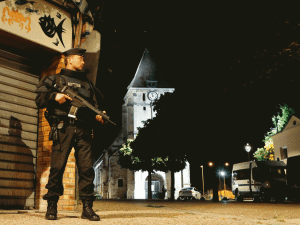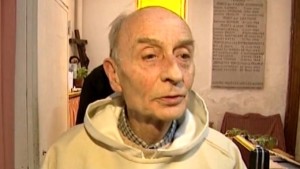 Cross-posted on the Corner.
Cross-posted on the Corner.
I posted something yesterday on Pope Francis’ disconcerting (there are other adjectives) response to the murder of Father Hamel in Normandy earlier this week, specifically with reference to this comment:
“I only want to clarify, when I speak of war, I am really speaking of war … a war of interests, for money, resources. … I am not speaking of a war of religions, religions don’t want war. The others want war.”
This, I argued, was wrong-headed for any number of reasons, not least the way that it effectively tried to downplay the wider religious significance of Father Hamel’s killing. That’s a topic that Damian Thompson has now addressed in The Spectator. Mr. Thompson, I should add, is not only an associate editor of The Spectator, but also the editorial director of the Catholic Herald:
Father Hamel was killed while re-enacting the death of Jesus Christ on the cross. That is the essence of the Catholic Mass, which — unlike Protestant commemorations of the Last Supper — is presented to the faithful as the same sacrifice offered by Jesus. To kill a priest who is saying Mass is therefore an act of unique desecration. You do not need to be a believer to grasp this point. Enemies of the church have understood it since the beginning: an early pope, St Sixtus, was beheaded during Mass in 258 ad by agents of the Emperor Valerian. Islamists, who reach back to the Dark Ages for so many of their actions, have rediscovered this crime. Their intense (and very successful) campaign to cleanse the Middle East of Christians reached its symbolic peak on 31 October 2010, when Father Thaer Abdal was shot dead at the altar of the Syrian Catholic church of Our Lady of Salvation in Baghdad. Fifty-seven other innocent people, many of them worshippers, died with him.
The gunmen who broke into the church during Sunday Mass were heard to scream: ‘All of you are infidels… we will go to paradise if we kill you and you will go to hell.’ They were members of an Iraqi faction of al-Qaeda that had declared war on churches, ‘dirty dens of idolatry’, and in particular ‘the hallucinating tyrant of the Vatican’. The motives of Islamic terrorists are sometimes hard to disentangle from their personal biographies and factional infighting. But sometimes they are obvious, and the only thing obscuring them is the politically correct preciousness of the liberal western media and commentariat. Many Islamic fundamentalists, including those who don’t participate directly in violence, loathe Christianity with a poisonous passion reminiscent of medieval Christian anti-Semitism. Its practice must be suppressed — either without violence, as in Saudi Arabia, or amid carefully staged scenes of bloodshed, as in Baghdad or Rouen.
In the 21st-century Middle East, Christianity has been suppressed on an astonishing scale….
Thompson goes on to ask whether the murder of Father Hamel will “awake Christendom from its torpor.” As evidence that it will not, he cites comments by Austen Ivereigh, a biographer of Pope Francis and a former spokesman for the English Catholic Church. Mr. Ivereigh is quoted as referring to the ‘pointless banality of the Rouen murder’ and as urging us not to glorify it by ‘ascribing religious motives’.
Well, to me at any rate, the “religious motives” were all too clear.
In a long, closely-argued piece for ABC, Mr. Ivereigh has now discussed the Pope’s response to Father’s Hamel’s killing, and specifically the description of the attack as “absurd” act of violence.
Absurd?
Ivereigh:
Absurd violence? The words seemed almost trite. There was no mention of martyrdom, or even of Father Hamel. The Pope’s attention was neither on the victim nor the perpetrator, but on the nature of the act; and rather than ascribing to it any religious or ideological motive, the Pope reduced it merely to an outpouring of hate. For Francis, it was not an attack, assault or a slaying – or any of the other terms we journalists love to use to dramatise – but a meaningless, pointless act; mere hatred; an absurdity…
Ivereigh duly tweeted the Pope’s words and duly received a disapproving response:
I was drawing attention, I said [to one critic], to the Pope’s focus on the act rather than the motives of the killers, which are at this stage – I was writing just hours after the event – frankly obscure. But based on previous ISIS-inspired acts, not least in Nice, the attackers were likely to be vulnerable, depressive losers lured into violence by radicals on the internet; to call them religious, I warned, was to buy into the Da’esh narrative, that this was a war of Islam on the West and Christianity.
This will not do. The murderers’ motives were never, frankly, that obscure, although elements in their mix might have been. Perhaps it’s easier for me, someone without any religious faith, to accept than it would be for Mr. Ivereigh, but people can be drawn to religion for any number of reasons, some noble, some far less so. Some of these people may be talented, secure and successful. Others may be “vulnerable, depressive, losers”, but they have all arrived at a religious destination, even if they may well have very different understandings of what that destination is.
Yes, there are good reasons to resist giving the current conflict with elements in Islam an incendiary label, and those reasons are strong enough to justify a noble lie or two, but lying to ourselves is not only unwise, but also dangerous.
Ivereigh cites the Archbishop of Marseilles:
“We are no longer in the realm of ideas,” he said – no small thing for a Frenchman to declare – but confronted with a very new kind of war, unknown until now.
Yes and no: Part of the effort to defeat ISIS must involve trying to understand its ideas. Ivereigh argues” that violence has no part in God’s plan; it is no-thing; it is absurd.” Well, that may be true of his God, but, God is in the eye of the beholder, and He can take forms that are not always so benign as Ivereigh believes.
Ivereigh adds:
[ISIS] is a wholly modernistic creation, a vehicle of power, the “technocratic paradigm” of domination and exploitation, applied to an ancient faith. ISIS militants are engineers, IT experts, lawyers and literalists; they are utterly Western, utterly modern, utterly unreligious.
I can’t agree. In a post last year on the topic of whether ISIS is nihilist (it’s not) I noted:
ISIS, like most millenarian movements, believes in a cleansing fire (and, in its case, in setting it), and ideologically it explicitly looks back (to the teachings attributed to Mohammed)… but to think that this also involves an embrace of the technologically pre-modern is evidently a mistake.
And in another post on the same subject, I cited the British philosopher John Gray:
[F]ar from believing in nothing, Isis militants are possessed by faith. Though some reports suggest that the militants may have been fuelled by euphoria-inducing drugs, their attacks are not random acts of terror. They are moves in a methodical strategy of savagery that serves an apocalyptic myth. Isis is an explicitly eschatological movement, infused with fantasies of cataclysmic end-time battles and a universal caliphate.
Indeed it is. It’s not the first of its kind. It won’t be the last. And it will not be wished away.
 Austen Ivereigh’s defense of Pope Francis’ response to ISIS appears to be, well, evolving.
Austen Ivereigh’s defense of Pope Francis’ response to ISIS appears to be, well, evolving.
 Cross-posted on the
Cross-posted on the 
 Cross-posted on the
Cross-posted on the  Cross-posted on the
Cross-posted on the Well, well, well..
Well, well, well.. With Islamist Turkish president Erdoğan continuing to take advantage of the failed coup that he has
With Islamist Turkish president Erdoğan continuing to take advantage of the failed coup that he has  Given the news from Turkey, a quote or two from Mustafa Kemal Atatürk seemed appropriate:
Given the news from Turkey, a quote or two from Mustafa Kemal Atatürk seemed appropriate:
